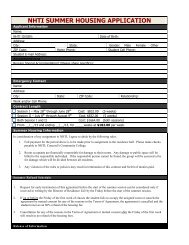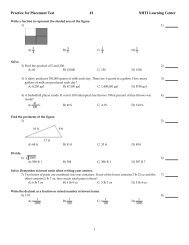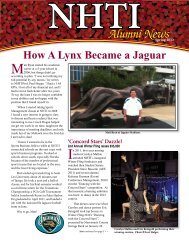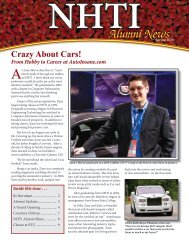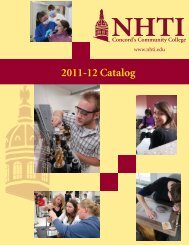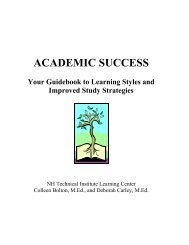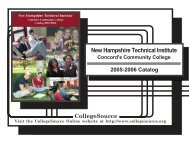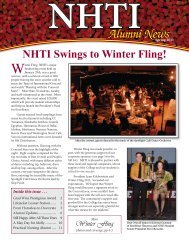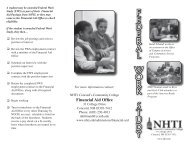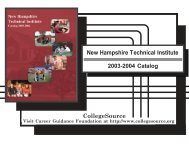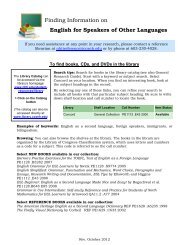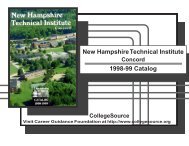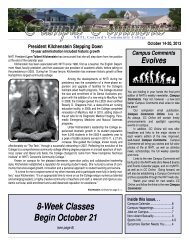Course Descriptions 11-12 - NHTI - Concord's Community College
Course Descriptions 11-12 - NHTI - Concord's Community College
Course Descriptions 11-12 - NHTI - Concord's Community College
- No tags were found...
You also want an ePaper? Increase the reach of your titles
YUMPU automatically turns print PDFs into web optimized ePapers that Google loves.
ehaviorism and presents a learning theory and teachingtechniques based on positive behavioral principles.Presentation and discussion focus on the ethical and clientrights issues of positive behavior change, and recent trendsand techniques for applying learning principles in a variety ofsettings. (Prerequisite: CS <strong>11</strong>1 and PY 105)CS <strong>11</strong>6 Assessment and Individual Planning 3-0-3This course reviews the process for designing andimplementing support for human service consumers.Presentation and discussion will include current and evolvingmodels for assessment and planning, as well as the factorsthat influence achievement of individual plans.(Prerequisites: CS <strong>11</strong>1, CS <strong>11</strong>5, PY 105, PY <strong>11</strong>0)CS <strong>11</strong>7 <strong>Community</strong> Social Service Practicum 2-8-4This course is designed to provide initial experience withhuman services programs, agencies, and their customers.The student will develop professionally and will surveyhuman services agencies and programs. The course will focuson issues of professionalism, ethics, the development ofinterviewing skills, and the analysis of case studies. Studentswill be expected to become familiar with a variety ofagencies or programs. Guest speakers, consumers, andothers may be invited to introduce students to theirparticular area of human services. A total of <strong>12</strong>5 hours will bespent in the field to meet the course requirement.(Prerequisites: CS <strong>11</strong>1, CS <strong>11</strong>2, CS <strong>11</strong>5, CS <strong>11</strong>6)Computer Aided DesignThese are individual courses and are not part of anyprogram.Computer Engineering TechnologyIn addition to listed prerequisites, students must earngrades of "C-" or higher in each course to progress in theprogram.CP 107 Introduction to Programming with C++ 2-3-3Introduces the student to program design using the languageC++. No prior knowledge of programming is assumed.Focuses on effective structured design of code withvariables, decisions, loops, functions, arrays and introductionof pointers. Use of professional programming designapproaches and coding style will be used in laboratoryassignments. Completion of this course provides theprogramming design skills to continue on with the study ofthe language C++ or other computer languages. A grade of C-or higher must be achieved to meet the prerequisite criteriafor subsequent major field courses.CP 215 Integrated Circuits and Interfacing 3-3-4For CPET and other NON-EET majors, this coursesupplements EL <strong>11</strong>5 (Digital Fundamentals) with basic linearand interface electronics. Topics covered include simplepower supplies, op-amps, stepper motors, A/D & D/Aconversion, and interfacing a computer bus. Advanced digitaltopics such as synchronous logic, programmable logic devicesand Digital Signal Processing will also be covered. The labsdemonstrate real world implementation of otherwiseabstract academic concepts. Fluency with the use of testequipment and debugging skills will also be stressed in thelaboratory environment. (Prerequisites: EL 101 and EL <strong>11</strong>5 orpermission of department head of Computer EngineeringTechnology)CD 101 CAD I 1-3-2Basic Training in the use of Computer Aided Drawing (CAD)including entity creation, editing, dimensioning, filemanagement, and plotting. A "hands on" approach will betaken while using PC based AutoCAD software. Applicationswill be taken from a variety of disciplines. This course doesnot meet requirements for the MET/MFT programs.CD 102 CAD II 1-3-2A continuation of CD 101 into more advanced concepts inComputer Aided Drawing. Topics include wire frame, surfaceand solid modeling as well as techniques to improveproductivity. This course does not meet requirements forMET/MFT programs. (Prerequisite: CD 101)CD 103 CAD III 1-3-2This course is a continuation CD 101 and CD 102. Emphasis isplaced on 3-D parametric solid modeling using AutodeskMechanical Desktop. Student will develop skills and utilizetechniques to produce geometric profiles that serve as adatabase for the production of 3-D models, workingdrawings, bill of materials and exploded views of assembledmodels. This course does not meet requirements forMET/MFT programs. (Prerequisites: CD 101 and CD102)CP 222 Data Communications and Internetworking 3-3-4This course provides the student knowledge and skills in awide range of topics covering data communications, packettransmission and the Internet. Data communicationssubtopics include transmission media, serialcommunications, error detection & correction schemes, datasecurity and signal processing required for long distancecommunications. Packet transmission subtopics include localarea networks, hardware addressing, LAN building blocks,and wide area networks. Internetworking subtopics includeTCP/IP communication stack, ISO 7-layer communicationstack, network addressing, Internet protocol (IP), addressresolution protocol (ARP), Internet control message protocol(ICMP), IP routing protocols, transport control protocol (TCP),user datagram protocol (UDP), and client-server API.(Prerequisites: CP 107 and CP 235; corequisites: CP 240, CP252 recommended; or permission of department head ofComputer Engineering Technology)CP 235 Algorithms With Object Oriented Programming 3-3-4This course focuses on the development, implementationand analysis of algorithms developed with object orienteddesign. Object oriented programming (OOP) techniques willbe used to solve algorithms such as stacks, queues and linkedlists. Concepts such as priority ranked data and objectcontainers as well as circular queues will be covered. Sorting,data manipulation and retrieval will be covered. Languageswhich support OOP will be used as the learning method. Both8/17/20<strong>11</strong> <strong>NHTI</strong>, Concord’s <strong>Community</strong> <strong>College</strong> <strong>Course</strong> <strong>Descriptions</strong> 20<strong>11</strong>-20<strong>12</strong> <strong>12</strong>



